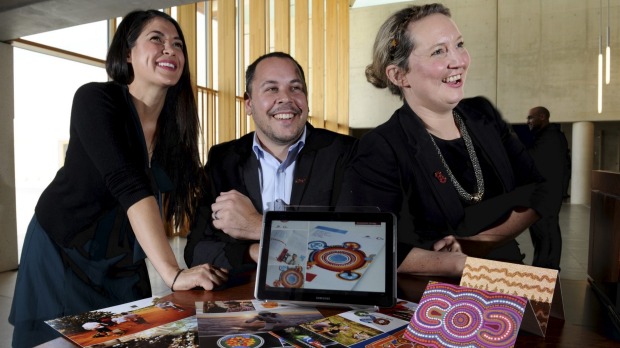
At the National Portrait Gallery, an expo was in progress in support of the federal government’s Indigenous Procurement Policy. Stallholder Gilimbaa, an Indigenous creative agency, had three of its management on hand to answer questions. From left, Monique Proud, project manager, chief executive David Williams and Amanda Lear, managing director. Photo: Graham Tidy
- For Amanda Lear it might be daunting heading a business with a handful of staff looking to win federal contracts when many of them are just too big.
Ms Lear, the managing director of creative design company Gilimbaa?, which employs Indigenous Australians, said the federal public service’s ability to be “elastic” – making contracts flexible to allow more small businesses to win work – would be the biggest challenge in the future.
She was one of the many managers of businesses employing Indigenous Australians at a “meet the supplier” event at the National Portrait Gallery on Tuesday.
The event was timed at the start of the federal government’s ambitious five-year journey to award 3 per cent of its to Indigenous businesses by 2020.
For the purposes of the new procurement policy, an Indigenous enterprise is one owned 50 per cent or more by Indigenous Australians.
“It’s a very exciting time for the Indigenous economy,” Ms Lear said.
Her company, which she co-founded, wanted work doing government advertising campaigns.
She said small businesses winning $20,000 to $80,000 contracts would be a wonderful way for young enterprises such as hers to grow.
Brisbane-based Gilimbaa would soon open an office in Canberra and Ms Lear said she expected other Indigenous businesses to do the same.
Brendan Paramore, account manager at Central Coast security company Fields Group, said the business he worked for had won little government work since opening in 2011 but that was gradually changing.
He expected a lot of the new work to come from contractors looking for subcontractors.
About 200 Commonwealth procurement officers turned up to the event, which had stalls for 55 Indigenous businesses.
The businesses were from a range of sectors including construction, human resources, office supplies, graphic design, catering, health, legal, software, management, consultancy, travel and finance.
According to the Department of the Prime Minister and Cabinet, Indigenous businesses were 100 times more likely to employ an Indigenous person than other entities.
“This policy is about creating opportunities for Indigenous businesses to grow and employ more people,” PM&C’s website said.
“The policy will put Indigenous businesses at the front and centre of the way the Commonwealth government does business.
“Whether through direct contracts or as part of the supply chain of some of Australia’s biggest companies, the Indigenous procurement policy will ensure that Indigenous businesses have the chance to compete and showcase the products they have to offer.”
